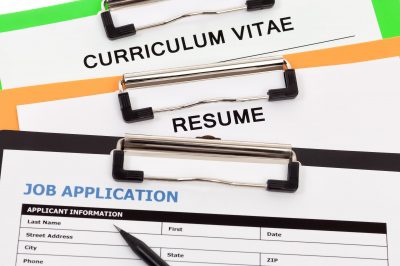According to the National Center for Education Statistics (NCES), close to 1.9 million students in the United States will graduate with a bachelor’s degree in 2016. Unfortunately, many of you who are graduates will apply for jobs using résumés with the types of mistakes that can severely hurt your chances to obtain the job of your choice. Why? Because most recruiters and hiring managers spend fewer than 15 seconds visually scanning a résumé, and are on the lookout for ways to screen out the ones who won’t make the first cut.
Here are 5 things that can “kill” your résumé:
- The e-mail address creates the wrong impression.
While “KegKing.com” may seem cool to your college buddies, it does not convey the best image, nor does it send the right message to potential employers.
Solution: Evaluate your e-mail address through the perspective of a potential employer. Using a respected e-mail provider, such as Gmail, create an e-mail address that uses your full name: e.g., chris.taylor@gmail.com.
- You can’t tell what s/he wants to do.
As a recent college graduate, you are at somewhat of a disadvantage: you may not have a great deal of relevant work experience, and your college major may not indicate a career direction. The challenge – and what’s most important – is for you to lead the reader’s thinking in a particular direction. For example, if your major was Finance and Accounting, it would be fairly easy to assume that you want a job in Finance or Accounting. If, however, your major was in Sociology or English, the career path or identity may not be as obvious.
Solution: There are two ways that you can indicate career direction. The first is to include a Summary at the top of your résumé that briefly summarizes your work experience and demonstrates the use of certain skills. For example, “Entry-Level Programmer/Coder (Basic C/C++) with 4 months’ experience during summer internship programs.” The second is to have a Skill Section at the top of your resume that lists the skills that (1) you’re good at; (2) you want to use; and (3) that are the most relevant for a particular job description. Most importantly, focus on why an employer would hire you.
- You included irrelevant information.
It’s a great idea to include awards, accolades, and activities from high school years when you’re applying to colleges or internships. However, high school is over, and employers are more interested in reading about what you’ve been doing while earning a college degree.
Solution: List internships, volunteer work, and/or jobs you held during your college years, to demonstrate your skills, drive, and work ethic.
- There are spelling and grammar errors.
Even the most careful writer can make a spelling or grammar mistake. Don’t let that be you! You may be in a rush to apply for a position that’s been posted online, or perhaps a friend of your parents has asked for a copy of the résumé and it’s not ready yet. What can you do about this?
Solution: After completing your résumé, run it through your spell-check software and then take some time to carefully review it – and then review it again. Ask someone you trust to proofread it (perhaps someone who majored in English). Other tricks: read it out loud, or read it backwards. That will prevent your eyes from making assumptions about what they see on the page. Additionally, most college graduates are accustomed to using a written shorthand (for mobile apps, texts, and tweets) – and might overlook errors.
- Listing references on your résumé.
References don’t belong on your résumé. Period. Hiring companies usually request references when they’re getting ready to make you an offer (at about the same time they ask for a background check and drug testing). It’s important not to list references or use the phrase, “References available upon request” at the bottom of a résumé. Well, of course they are!
Solution: Develop a list of references on a separate sheet of paper that is not attached to your résumé. At the top of the page, list your contact information as it appears on the top of your résumé. Below, list your references: 2 professional (e.g., from current or previous employers or from college professors) and 1 personal reference (e.g., a friend or colleague who knows you well and can attest to your work values and skills). Do not use a relative as a reference (someone with the same last name as yours) – it’s painfully suspicious when your mother tells a hiring manager what a great child you’ve been! References can prove advantageous during the hiring process – choose them wisely!
 A résumé is a terrific tool – and resource – that will help you jump start your career. With thought, planning, and perseverance, it can provide you with the means to motivate a recruiter or hiring manager to pick up the phone and invite you in for an interview. Good luck!
A résumé is a terrific tool – and resource – that will help you jump start your career. With thought, planning, and perseverance, it can provide you with the means to motivate a recruiter or hiring manager to pick up the phone and invite you in for an interview. Good luck!
Robyn Winters is a Career Strategist at TBJL and has more than 20 years experience in workforce development.
Photo Credit: Phaseinphoto | FreeDigitalPhotos.net


 A résumé is a terrific tool – and resource – that will help you jump start your career. With thought, planning, and perseverance, it can provide you with the means to motivate a recruiter or hiring manager to pick up the phone and invite you in for an interview. Good luck!
A résumé is a terrific tool – and resource – that will help you jump start your career. With thought, planning, and perseverance, it can provide you with the means to motivate a recruiter or hiring manager to pick up the phone and invite you in for an interview. Good luck!